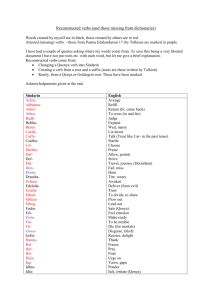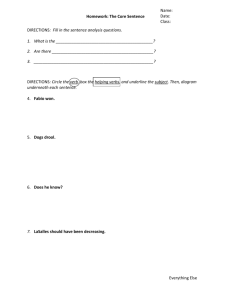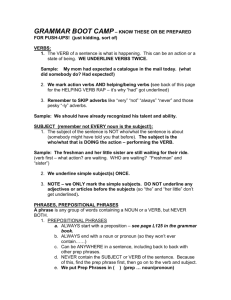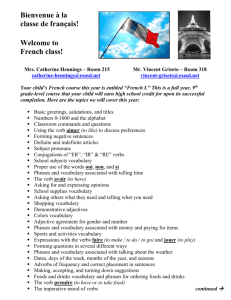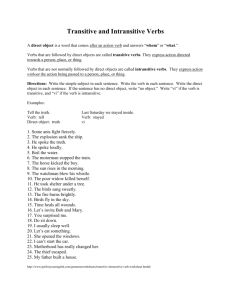Verb identification definition and exercises
advertisement
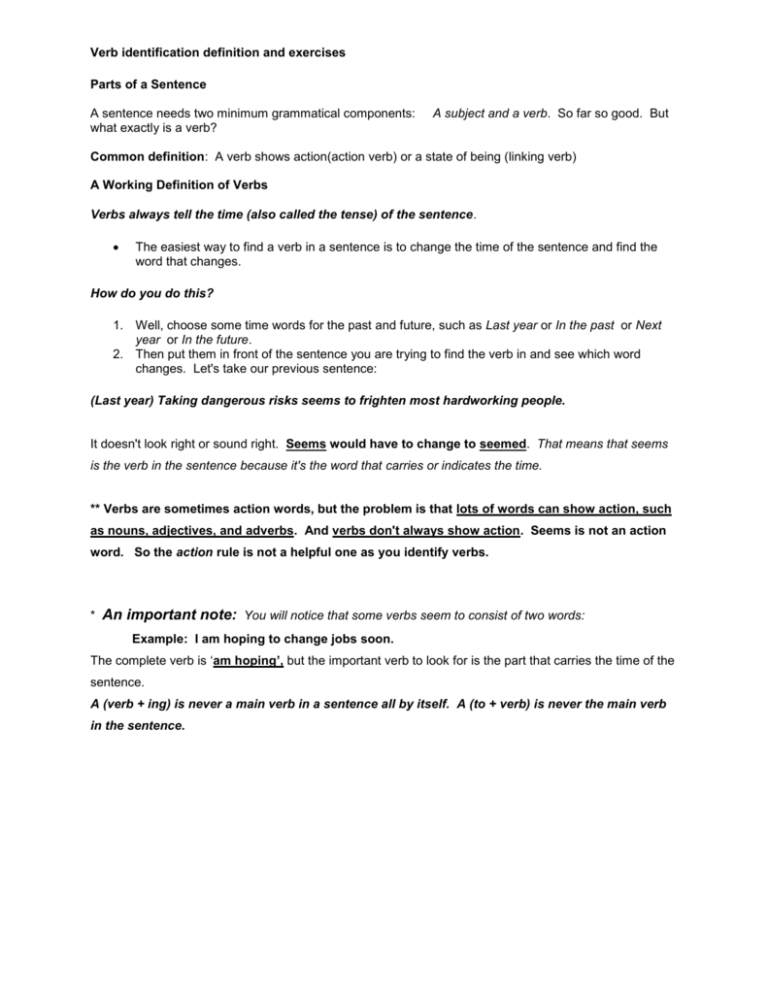
Verb identification definition and exercises Parts of a Sentence A sentence needs two minimum grammatical components: what exactly is a verb? A subject and a verb. So far so good. But Common definition: A verb shows action(action verb) or a state of being (linking verb) A Working Definition of Verbs Verbs always tell the time (also called the tense) of the sentence. The easiest way to find a verb in a sentence is to change the time of the sentence and find the word that changes. How do you do this? 1. Well, choose some time words for the past and future, such as Last year or In the past or Next year or In the future. 2. Then put them in front of the sentence you are trying to find the verb in and see which word changes. Let's take our previous sentence: (Last year) Taking dangerous risks seems to frighten most hardworking people. It doesn't look right or sound right. Seems would have to change to seemed. That means that seems is the verb in the sentence because it's the word that carries or indicates the time. ** Verbs are sometimes action words, but the problem is that lots of words can show action, such as nouns, adjectives, and adverbs. And verbs don't always show action. Seems is not an action word. So the action rule is not a helpful one as you identify verbs. * An important note: You will notice that some verbs seem to consist of two words: Example: I am hoping to change jobs soon. The complete verb is ‘am hoping’, but the important verb to look for is the part that carries the time of the sentence. A (verb + ing) is never a main verb in a sentence all by itself. A (to + verb) is never the main verb in the sentence. Exercise 1: Identifying verbs Change the following sentences to the future or past to find the word. If you try past, and the word doesn't change, then the sentence may already be in the past, so the verb won't change. Then try the future. Example: (Next year) I took (will take) a big risk in applying for a new job in the same company. Took would change to will take so took is the verb. (In the past) I never want (wanted) to see that look on her face again. Want would change to wanted so want is the verb. 1. We hear a lot of talk about the American melting pot. 2. Here, in our current neighborhood, it exists. 3. But in other neighborhoods, people raised their children to reject their cultures. 4. The newspapers are full of stories about hatred and violence. 5. The old immigrants have suspicions about the new immigrants. 6. The new immigrants think that the old ones are bigots. 7. In our first neighborhood, I lived near a lot of old Italians. 8. They complained about the other groups living in the area. 9. They never blamed me for anything. 10. They liked me. So I was not one of "the others." Finding Verbs Read the following paragraph and underline the verbs. Some sentences will have more than one verb. Cartoon superheroes are made up of a number of common traits. They have extraordinary powers and abilities. They vary greatly, but superhuman strength, the ability to fly and the ability to project energy are often common. Batman and Green Hornet possess no superpowers but they know martial arts. Most superheroes risk their own safety in the service of good. Many refuse to kill an opponent, even though they threaten the safety of others. Many superheroes use a descriptive or symbolic code name. A supporting cast of characters includes the hero’s friends and family. Superheroes often have a secret headquarters or base. Female characters include Invisible Girl, and Marvel Girl. Some examples of nonCaucasian characters are the Black Panther, Shang Chi and Cyborg. Subject identification definition and exercises Finding Subjects Finding subjects is easy once you have found the verb in the sentence. 1. Subjects usually come before verbs. 2. The subject is the word that you find when you ask the question (Who or What) + (Verb) + (The rest of the sentence)? Let's take our first example: Taking dangerous risks seems to frighten most hardworking people. What + Verb + The rest of the Sentence? (What) seems to frighten most hardworking people? The answer is: Taking dangerous risks. So ‘Taking dangerous risks’ is the subject of the sentence. Let's go back to exercise #1 where you already found the verbs and find the subjects of those verbs. Finding Subjects Exercise #1 Verb 1. We hear a lot of talk about the American melting pot. (Who) hears a lot of talk about the American melting pot? Answer: We = Subject 2. Here, in our neighborhood, the melting pot exists. (What) exists? Answer: The melting pot = Subject 3. But in other neighborhoods, people raised their children to reject their cultures. 4. The newspapers are full of stories about hatred and violence. 5. The old immigrants are suspicious of the new immigrants. 6. The new immigrants think that the old ones are bigots. 7. In our neighborhood, I lived near a lot of old Italians. 8. My Italian neighbors complained about the other groups living in the area. 9. They never blamed me for anything. 10. They liked me. Therefore, I was not one of "the others." Rule: The subject of a sentence can never be found within a prepositional phrase. Prepositions are little words that introduce nouns and show their relationship to another part of the sentence. Here is a list of common prepositions: About Above Across After Against Along Among Around As At Before Behind Below Beneath Beside Between Beyond By Down During Except For From In Inside Into Like Near Next Of On Out Over Past To Toward Under Until Since Up Off Through With Without Prepositional phrases are a combination of a preposition + a noun Examples: In our neighborhood To the best Of my ability Exercise: Finding Subjects and Prepositional Phrases Part A. Put brackets around the prepositional phrases in the following paragraph. The first sentence is done for you. [At the age] [of twelve] I won the swimming award [at the Lions Camp] [for Crippled Children]. When my name echoed over the PA system the girl in the wheelchair next to me grabbed the speaker of my hearing aid and yelled, "You Won!" I was the only physically unencumbered child in a sea of braces and canes. I was ashamed of this, so I limped on my way to the stage. The truth was that I was ashamed of my handicap. I wanted to be in the same category as the girl who had lost her leg in an accident. In my eyes deafness was not a desirable handicap. Part B. Now underline the subjects. Remember that subjects cannot be found in prepositional phrases. Finding Subjects Exercise Underline all the subjects in the following sentences. 1. Sports have many benefits for our lives. 2. They help us develop strong bodies and they make us independent. 3. Competition teaches us about fair play and sportsmanship. 4. When people play sports regularly, they live longer lives with healthier hearts. 5. Excelling at sports makes us proud of ourselves and losing sometimes motivates us to do better.. 6. But not all of us agree that sports are beneficial for kids. 7. Parents get too involved in their children’s success at times. 8. They argue and cause problems at their children’s games. 9. They blame their kids when the kids lose or play poorly. 10. This causes children to feel low self-esteem. Exercise: Finding Subjects Read the following paragraph again and underline the subjects. Some sentences will have more than one subject. Cartoon superheroes are made up of a number of common traits. They have extraordinary powers and abilities. They vary greatly, but superhuman strength, the ability to fly and the ability to project energy are often common. Batman and Green Hornet possess no superpowers but they know martial arts. Most superheroes risk their own safety in the service of good. Many refuse to kill an opponent, even though they threaten the safety of others. Many superheroes use a descriptive or symbolic code name. A supporting cast of characters includes the hero’s friends and family. Superheroes often have a secret headquarters or base. Female characters include Invisible Girl, and Marvel Girl. Some examples of non-Caucasian characters are the Black Panther, Shang Chi and Cyborg. Finding Subjects, Verbs, and Prepositional Phrases: In the following paragraph: 1. Put brackets around the prepositional phrases. 2. Underline the subjects. 3. Circle the verbs. The Chinese animal signs are a 12 year cycle dating the years. They represent a circular concept of time. In the Chinese calendar, the beginning of the calendar falls between late January and early February. The Chinese have adopted the Western calendar except for festive occasions such as the Chinese New Year. Each of the animal signs has a horoscope. A Pig and an Ox bring prosperity. Tigers have magnetic personalities with others while Rabbits are unhappy with strangers. Dragons lose their tempers easily. Snakes lean toward elegance and expensiveness while Rats tend to budget carefully. Roosters begin many projects at one time to keep busy Dogs and Horses react unpredictably but they form good relationships with others. Monkeys project an image of mischief, and Sheep resent being led by others

